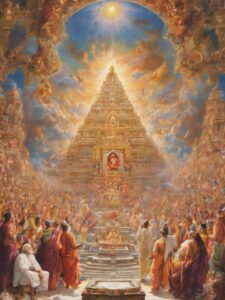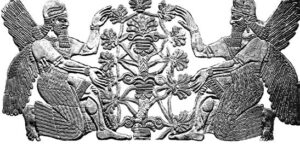Table of Contents
When we die, our soul experiences different fates. A virtuous life may lead us to heaven, where we join angels and gods in paradise. Conversely, an unvirtuous life may result in eternal suffering in the depths of hell.
What Is Heaven?
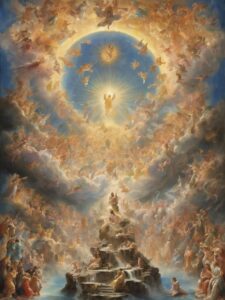
Religious Perspective:
In many monotheistic religions such as Christianity, Islam, and Judaism, “Heaven” refers to a divine realm where the righteous or believers experience eternal joy, peace, and closeness to the divine.
Mythological Perspective:
In mythology, heaven often represents a divine realm where gods, spirits, or immortal beings reside. It’s a place of perfection, eternal joy, and cosmic order. Mythological heavens are associated with creation, the afterlife, or realms accessible to select heroes or chosen individuals. These celestial realms often embody cultural ideals, reflecting the values and aspirations of a society. The mythological concept of heaven transcends mortal limitations, offering a glimpse into the extraordinary and the divine.
Philosophical Perspective:
Some philosophical traditions may view heaven as a state of ultimate happiness, enlightenment, or fulfillment. This could be achieved through virtuous living, self-realization, or the pursuit of knowledge.
Cultural Perspective:
In cultural contexts, heaven might be associated with paradisiacal landscapes, celestial beauty, or a place of harmony and serenity.
Symbolic Perspective:
Beyond religious or cultural beliefs, “Heaven” can also be used metaphorically to represent a state of bliss, perfection, or an idealized existence.
Religious Perspective:
Christianity
Heaven in Christianity is depicted as the ultimate destination for those who have accepted Jesus Christ as their Savior. The criteria for entry revolve around faith in Jesus and living a life in accordance with Christian teachings. The Bible emphasizes the importance of grace and forgiveness through Jesus for attaining eternal life in heaven.
Upon entering heaven, believers undergo a profound transformation, receiving glorified, incorruptible bodies free from earthly limitations. This change is a state of spiritual and physical perfection.
Heaven’s activities center on worship and eternal communion with God. Believers engage in continuous praise, adoration, and fellowship with the divine. The joy and fulfillment surpass earthly pleasures, promising believers everlasting peace and contentment.
Individuals in heaven are radiant and glorious beings. The Bible suggests believers will be recognizable, yet their transformed bodies reflect the divine nature of their eternal existence.
Heaven is also depicted as a place where believers can reunite with departed loved ones. The biblical narrative includes references to meeting biblical figures, angels, and fellow believers. The sense of community and connection is integral to the heavenly experience.
The biblical descriptions of heaven emphasize the absence of suffering, sin, and death. It is a realm where God’s presence is constant, and believers bask in the fullness of divine love and grace for all eternity. The concept of heaven serves as a source of hope, assurance, and inspiration for Christians as they navigate their earthly lives with the expectation of an eternal home in the presence of God.
Islam
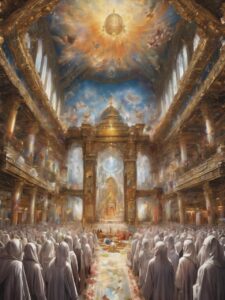
In Islam, heaven, called Jannah, rewards those demonstrating sincere faith (iman) and righteous deeds (amal). Entry is determined by God’s mercy and justice on Judgment Day. God weighs deeds, granting Jannah to those with a balance favoring good actions.
Transitioning to paradise’s activities, the Quran details exquisite pleasures: gardens, flowing rivers, luxurious dwellings, and delectable fruits. Believers find eternal contentment and happiness in the divine presence.
Though direct communication with earthly loved ones isn’t explicitly detailed, the Quran promises believers the fulfillment of desires and joys. Emphasizing companionship, believers enjoy the company of loved ones and like-minded individuals.
Physically, individuals in paradise are described with eternal youth and beauty, adorned in luxurious garments. Quranic verses convey perfection, free from imperfections and blemishes.
In heaven, believers meet prophets, angels, and righteous companions. The Quran highlights the joy of reuniting with loved ones and engaging in harmonious companionship. The atmosphere is perpetual bliss, surrounded by divine favor and the rewards of a virtuous life.
The Islamic concept of heaven serves as a source of motivation for believers, encouraging them to live a life in accordance with Islamic principles and moral conduct. The promise of paradise provides solace and hope, emphasizing the ultimate reward for a life devoted to faith and righteousness.
Judaism
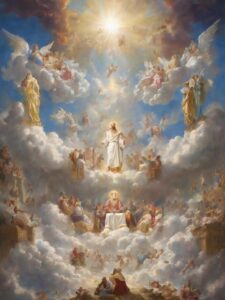
In Judaism, the concept of an afterlife is multifaceted, with variations in beliefs among different Jewish denominations. While traditional Jewish thought places a strong emphasis on the importance of earthly life and fulfilling divine commandments, there are varying perspectives on the nature of the afterlife.
Believers enter the afterlife through Olam Ha-Ba, the World to Come, with judgment based on deeds and adherence to Jewish commandments (mitzvot). Righteous individuals earn a place in Olam Ha-Ba.
In the afterlife, activities in Judaism prioritize spiritual fulfillment over physical pleasures. The righteous bask in the divine presence, participating in continuous study and fostering closeness to God.
Communication with the Living: Traditional Jewish beliefs typically do not emphasize direct communication between the living and those in the afterlife. Instead, the focus is on the enduring impact of one’s deeds and teachings on future generations.
Appearance in the Afterlife: Descriptions of the appearance of individuals in the afterlife vary. Some sources suggest a spiritual existence, while others may envision a form of bodily resurrection. The emphasis is often on the soul’s connection with God.
Meeting Spiritual Figures: The afterlife is seen as a place where individuals can reunite with departed loved ones and encounter spiritual figures. The emphasis is on the continuity of relationships and the collective experience of drawing closer to God.
Judaism’s perspective on the afterlife reflects the diversity within the Jewish tradition. While some branches may focus on the concept of resurrection, others emphasize the enduring impact of one’s legacy and teachings. The overarching theme centers on the eternal connection with God and the reward for a life dedicated to righteousness and adherence to divine commandments.
Hinduism
In Hinduism, the concept of heaven is multifaceted, encompassing various celestial realms known as Svarga Loka, each associated with different deities and levels of spiritual attainment.
Entry and Karma: Access to heavenly realms hinges on one’s karma, the sum of deeds in past lives. Righteous actions and adherence to dharma contribute to positive karma, ensuring entry.
Transitioning to Activities and Pleasures: Hindu heavens depict realms of beauty and divine pleasures. Celestial music, dance, and ambrosial nectar consumption abound. The atmosphere is blissful and serene.
Moving to Communication with the Living: Hindu scriptures, like the Bhagavad Gita, stress life’s cyclical nature. While direct communication with the living isn’t detailed, focus centers on the soul’s journey through successive lives for spiritual evolution.
Shifting to Physical Appearance: In heavenly realms, individuals possess celestial bodies, free from earthly limitations. These bodies radiate purity, divine qualities, and a connection to the cosmic order.
Concluding with Meetings in Heaven: In Hindu heavens, inhabitants meet celestial beings, gods, and ancestors. Such encounters contribute to spiritual growth, fostering a deeper understanding of cosmic truths.
Heaven in Hinduism is not a final destination but a part of the larger cycle of samsara (the cycle of birth, death, and rebirth). The ultimate goal is moksha, liberation from this cycle, and union with the divine. The concept of heaven serves as a realm of reward for virtuous actions, encouraging individuals on their spiritual journey toward higher states of consciousness.
Buddhism
In Buddhism, entrance to heaven hinges on one’s karma. Positive actions determine eligibility for heavenly abode. Individuals undergo a judgment based on life deeds.
Upon entering, ethereal landscapes unfold, adorned with celestial beauty. Transitioning into this heavenly realm, blissful serenity envelops those who meet the criteria. Communication extends beyond earthly bounds, seamlessly connecting souls with loved ones.
Heavenly beings, radiant and tranquil, embody perfected virtues. Emanating benevolence, they share wisdom and compassion boundlessly. Furthermore, noble entities guide newcomers, fostering spiritual growth and understanding.
Transcending earthly constraints, encounters in heaven surpass temporal limitations. Souls reunite, rekindling connections in a realm of eternal love. Moreover, joyful reunions with departed loved ones bring solace and fulfillment.
Activities in heaven revolve around enlightenment pursuits. Meditative practices flourish, fostering continual spiritual evolution. Additionally, wisdom-sharing gatherings and celestial celebrations harmonize the ethereal realm.
Heavenly inhabitants manifest diverse forms, each reflecting inner purity. Radiant auras and serene countenances mirror the souls’ virtuous nature. Furthermore, diversity in appearance signifies the multitude of paths leading to enlightenment.
Meetings with revered spiritual figures are commonplace. Buddha, Bodhisattvas, and enlightened beings offer guidance and profound teachings. Consequently, universal harmony prevails as kindred spirits unite in a shared journey toward enlightenment.
Transitioning seamlessly between dimensions, heaven in Buddhism offers an eternal sanctuary. The cosmic tapestry of existence weaves interconnected threads, linking souls in a harmonious symphony of enlightenment and everlasting joy.
Mesopotamia
In Mesopotamian religions, the concept of an afterlife was present, but it differed significantly from the modern Western idea of heaven. The Mesopotamians believed in a netherworld or underworld, often referred to as the “Land of No Return” or “Kur.” This realm was considered a dark and dreary place, contrasting sharply with the notion of a blissful heaven.
In Mesopotamian cosmology, the afterlife was envisioned as a gloomy underworld, where all souls, regardless of their deeds in life, converged. The ruler of this netherworld was usually a deity, such as Ereshkigal in Sumerian mythology or Nergal in Babylonian and Assyrian traditions. The afterlife was a shadowy existence, devoid of the vibrant life experienced on Earth.
The Mesopotamian understanding of the afterlife lacked the moral distinctions that are characteristic of many later religious traditions. In other words, there was no clear differentiation between a reward for the righteous and punishment for the wicked in the afterlife. Instead, all souls faced a uniform fate in the underworld.
While Mesopotamian cultures had rich mythologies and religious practices, their concept of the afterlife was notably different from the paradisiacal notions of heaven found in some other world religions. The focus was often on appeasing deities, ensuring a smooth transition to the afterlife, rather than the promise of eternal reward or punishment based on moral conduct.
Egypt

In ancient Egyptian religion, the concept of an afterlife played a central and distinctive role. The Egyptians believed in a complex journey of the soul after death, culminating in an eternal existence in the “Field of Reeds” or “Aaru.” This concept is often associated with the term “heaven” due to its positive and paradisiacal nature.
The journey to the afterlife initiated with mummification, preserving the body for the soul’s return. The soul, “ka,” and life force, “ba,” continued in the afterlife. In the Hall of Ma’at, Osiris judged, weighing the deceased’s heart against the feather of truth.
If the heart proved light as the feather, signifying virtue, the deceased entered the Field of Reeds. This heavenly realm, abundant and blissful, offered pleasures akin to earthly life. Abundant food, flowing waters, and serene existence characterized this eternal paradise.
The concept of an afterlife in ancient Egypt was intricately tied to religious beliefs and rituals. The Book of the Dead, a collection of spells and rituals, guided the deceased through the challenges of the afterlife journey. The pharaohs, in particular, believed in a divine kingship that extended beyond death, associating themselves with gods and securing a privileged place in the afterlife.
While the Egyptian concept of the afterlife shares some similarities with the idea of heaven, it is essential to recognize its unique features, including the emphasis on the soul’s journey, judgment, and the Field of Reeds as a place of eternal reward.
Confucianism
In Confucianism, which is more of a philosophical and ethical system than a religious tradition, the concept of heaven takes on a unique and nuanced meaning. The term “heaven” (Tian 天) in Confucian thought is often used to represent the ultimate source of moral order and the cosmic force that governs the universe. While Confucianism doesn’t provide detailed descriptions of an afterlife or heaven in the way some religions do, it does incorporate the idea of cosmic harmony and moral order associated with heaven.
Key points regarding the concept of heaven in Confucianism include:
Moral Order and Harmony: Confucius and his followers emphasized the idea that heaven is the source of moral order and cosmic harmony. The concept of “Li” (ritual propriety) and “Ren” (benevolence) are crucial components of aligning oneself with the will of heaven. Living a virtuous and ethical life is seen as being in harmony with the cosmic order.
Mandate of Heaven: The concept of the “Mandate of Heaven” is significant in Confucian political thought. It suggests that rulers govern with the approval and support of heaven as long as they adhere to virtuous and just governance. If rulers deviate from this path, they risk losing the mandate, leading to the potential downfall of their reign.
Ethical Conduct: Confucian teachings emphasize the importance of ethical conduct in both personal and societal realms. By cultivating virtues and practicing benevolence, individuals align themselves with the moral principles associated with heaven.
Connection to Ancestors: While Confucianism doesn’t focus explicitly on an afterlife, there is an emphasis on filial piety and ancestral veneration. Honoring one’s ancestors is considered a way of maintaining familial and cosmic harmony, and it reflects a sense of continuity and connection with the past.
FAQ
Do all religions believe in heaven?
No, beliefs about heaven vary among different religions and cultural systems. Some have explicit concepts of heaven, while others may have different afterlife beliefs or none at all.
How do you get to heaven?
Different religions have diverse criteria for entry into heaven. Common themes include virtuous deeds, faith, adherence to religious commandments, and divine grace.
Is heaven a physical place?
Views on the physicality of heaven differ. Some see it as a tangible place, while others interpret it more symbolically as a state of being or consciousness.
Can atheists or non-believers go to heaven?
Beliefs vary, but some religious traditions reserve heaven for followers who adhere to specific faith tenets. Others may emphasize moral conduct and virtuous living.
What activities are there in heaven?
Descriptions vary, but many religious traditions depict heavenly activities as joyous and centered around spiritual fulfillment, worship, and communion with the divine.
Can you communicate with loved ones in heaven?
Beliefs differ. Some religions envision direct communication, while others emphasize a more spiritual connection or reunion in an afterlife.
How does heaven look?
Descriptions range from idyllic landscapes to celestial realms, often characterized by beauty, purity, and a sense of eternal peace. Physical appearance may be depicted as radiant and perfect.
Are there different levels or types of heaven?
Yes, some religious traditions propose multiple levels or different types of heavenly realms based on varying degrees of spiritual attainment or divine favor.
Do people retain their individuality in heaven?
Beliefs differ; some envision retaining individual identity, while others emphasize a merging with the divine or a collective spiritual existence.
What role do myths and literature play in shaping ideas about heaven?
Myths, religious texts, and literature have played a significant role in shaping cultural perceptions of heaven, providing narratives and imagery that influence beliefs and interpretations.

